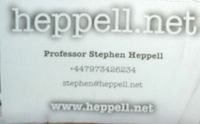
Great workshop at Ulearn05

Professor Stephen Heppell looks nothing like a professor but once you start to listen to what he says, or more to the point watch all the practical things he can access from his computer, there is no doubt about the wisdom his wide ranging experience has given him.
And I only went to his workshop on a whim; serendipity is an underrated form of intelligence!
I loved his comments that teachers, like the troops in WW 1, are like ‘lions led by donkeys!’ Stephen’s illustrated interactive dialogue was all about liberating teachers, and in particular young people, from the confining institutions of traditional education.
Visit his site and find your way to visit schools he has designed, or worked with, in his role as an international designer. The examples he shared with us were enlightening and showed the use of technology in the service of student’s creativity. So much of what ICT ‘experts’ show you may be high in technology but all too often is lacking in aesthetics and design!
Stephen’s session illustrated with real insight the point that human creativity and imagination are the sources of innovation – a point I feel is sometimes forgotten by ‘techno freaks’. All too often computers are ‘over sold and underused’ – or as one writer (Clifford Stoll) wrote, ‘silicon valley snake oil!’
Stephen illustrated that the curriculum has ‘left the school building’ and now exists at point of intersections on the web. A ‘stand and deliver’ teaching approach is now obsolete even teachers and curriculum developers, in their splendid isolation, haven’t noticed. There is no role left for teachers at the centre controlling things; our role is to assist our learners learn for themselves. As Stephen said, ‘we now make and create our own worlds’ illustrating how students can make their own videos using their cell phones!
Curriculum is now an ‘emergent’ one and the task for students is to generate their own content and to do better than they did last year. Traditional curriculums present structures and ‘rules’ that slow teachers and kids down and, as a result, too many kids are disenchanted. To add to the confusion developers are always adding in new requirements! And the lack of continuity between levels of schooling ought to disappear. ‘Kids interest in learning doesn’t drop off – we kill it!’
What kids want are 'cool' topics. Curriculum developers need to ‘bin the lot’ or at least ‘thin the requirements’ radically. The 21stC is here student learning is now about 'detective work researching and swapping cool stuff'. 'Everyone is an action researcher!'
A model suggested by Stephen for students to use was:
1. What do you want to learn? What do you know already?
2. Now set your targets and how you intend to get there.
3. Put your work on a website.
4. When the above is done an outside examiner asks generic questions about tasks and milestones – and this can be done on mobile phone ( with voice recognition facilities)
This ‘constructivist’ process creates an instant portfolio or a learning journey.
A similar model for Professional Development was also illustrated. Teachers outline what they want to know and how they are to go about achieving it. They set their own targets and their final knowledge is then assessed.
A model for all teachers to work within their own schools to gain a Doctorate was outlined:
1. The school develops a shared hypothesis about an area(s) to improve.
2. Through collegial scholarship teachers explore the area chosen.
3. Teachers undertake action research. They do it, iterate it, and exhibit and share finding on the web
4. The school is examined and teachers graduate as a cohort.
This ‘learning organization model’ is already in place with UNESCO but schools to be part of the project have to work with a school in an underdeveloped country.
We can now share idea and practice without leaving our schools. ‘It could not be more exciting’ Stephen concluded.
An inspiring and practical session – and presented with humour!
Try the following sites:
Stephens website, with access to all sorts of wonderful ideas.
Teachers TV site
learn3k
5 comments:
Yes, teachers as "lions led by donkeys" sums up things nicely!
The sad thing is when lions gradually turn into donkeys.
Wish there were more lions - or at least that they regained their voices and roared a bit! Too long in the zoo for too many of us - lost our creative wildness.
Schools would be better off arranging their own development as Heppell describes rather than buying into the Ministry 'one size fits all' contracts.
I agree. Heppell is currenty working with the Ministry in the area of innovative uses of ICT.
I see that the prof has now got some kind of retro-blog on his site... http://www.heppell.net sort of looking back at what he did in the past from today's viewpoint which in practice is old bits of writing with a new foreword. But there are some great bits and pieces there already and now he's promising a weekly podcast which should be entertaining. I've heard him speak several times and laughed, then thought, a lot. And the more I thought the btter it seemed to get. Pity there wasn't a video of the thing you were at...
Post a Comment